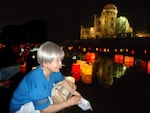Dr. Hideko Tamura Snider was only eight years old when the U.S. military dropped an atomic bomb on the city of Hiroshima, Japan, on Aug. 6, 1945.
"I shall never be able to erase images of the horrific event and things that followed. And the sound. And the physical sensation of being inside the mushroom cloud. Being in the breaking structures and the terror of fleeing on foot by myself. That will never go away."

Dr. Hideko Tamura Snider lights a peace lantern in Hiroshima on the 70th anniversary of the Hiroshima bombing.
Courtesy of Dr. Hideko Tamura Snider
In the days following, she went from one rescue station to another in search of
her mother, who she was separated from during the bombing. Looking among the survivors and the singed bodies was an unbearable experience. At a certain point all she could do was pray to God to bring comfort to her mother.
After the bombing, Snider became gravely ill from radiation, but she survived and eventually moved to the U.S. She said that the trauma from the event caused her to completely lose touch with her emotions.
"Somehow, my entire psychic system learned to suppress this so I could live. So I would not fall apart."
After moving to the U.S., Snider became a psychiatric social worker at the University of Chicago Medical Center. It wasn't a job that she particularly wanted, but she had a difficult time qualifying for any of the other positions on the campus.
Initially she found that surrounding herself with patients suffering from serious illnesses was extremely difficult. One day, she treated a patient who had recently undergone a liver transplant. It was at that moment she realized how well-equipped she was to support those who are suffering. Living through the Hiroshima bombing allowed her to empathize with patients while giving them hope and encouragement. She was finally able to regain her emotional life through her work in human services.
More recently, Snider has devoted her time to chronicling the bombing of Hiroshima through her memoir "One Sunny Day" and advocating against the use of nuclear weapons. She believes there is a very limited understanding of the severity of the Hiroshima disaster in the U.S.
In particular, she said people don't know about the consequences of radiation. She explains how soil and water reserves were contaminated with high levels of radiation for decades afterwards. Survivors absorbed the radiation and often contaminated those who treated them.
Today, Snider lives in Medford. She recalls how on the 62nd anniversary of the explosion she celebrated the birth of one of her grandchildren. The stark contrast between the anniversary of the death of many loved ones and the birth of a new life completely changed the way she interpreted her grief. She said her grief has transformed into a motivation to urge others to do hopeful things.
Contact "Think Out Loud"
If you'd like to comment on any of the topics in this show, or suggest a topic of your own, please get in touch with us on Facebook or Twitter, send an email to thinkoutloud@opb.org, or you can leave a voicemail for us at 503-293-1983. The call-in phone number during the noon hour is 888-665-5865.